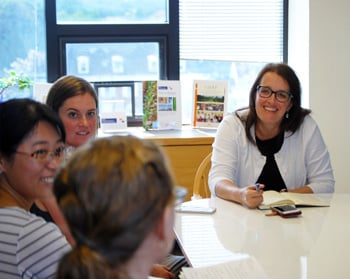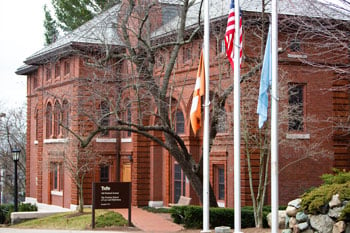2019 Graduate Education | International Affairs
THIS GUIDE IS NO LONGER ACTIVE. For the current FP Guide, click here.
The Fletcher School at Tufts University
As a professor of energy and environmental policy at The Fletcher School at Tufts University, Kelly Sims Gallagher brings experience as an influential policymaker. For example, when she was a senior adviser at the White House, Gallagher played a major role in negotiating the U.S.–China climate accord that paved the way for the landmark global Paris Agreement in 2016. During the negotiation process, she often found herself drawing on concepts and themes she had learned more than a decade earlier at The Fletcher School.

“Fletcher has a flexible curriculum that allows students to experiment with different sectors, like the private sector or the public sector, and with different substantive fields.” –Kelly Sims Gallagher, Professor of Energy and Environmental Policy, The Fletcher School at Tufts University
Gallagher earned her Master of Arts in Law and Diplomacy (MALD) and PhD at Fletcher. From June 2014 to September 2015, she was a senior policy adviser in the White House Office of Science and Technology Policy and senior China adviser in the State Department’s Office of the Special Envoy for Climate Change.
Typical of Fletcher’s interdisciplinary approach, Gallagher pursued her graduate work in environmental and resource policy alongside East Asian studies, with a simultaneous focus on negotiations and conflict resolution. That cross-section of studies prepared her for post-doctoral work at Harvard, a summer as a visiting professor at Tsinghua University in Beijing, and her roles in the Obama administration.
 “I drew on all of those fields when I was working in the White House and with the State Department,” recalls Gallagher, who also co-directs The Fletcher School’s Center for International Environment and Resource Policy and directs Fletcher’s Climate Policy Lab. “We were engaged in an international negotiation, and one of my jobs was to determine what was possible.”
“I drew on all of those fields when I was working in the White House and with the State Department,” recalls Gallagher, who also co-directs The Fletcher School’s Center for International Environment and Resource Policy and directs Fletcher’s Climate Policy Lab. “We were engaged in an international negotiation, and one of my jobs was to determine what was possible.”
At The Fletcher School, she had learned concepts such as the “zone of possible agreement”—the area where two or more sides in a negotiation might be able to find common ground. Gallagher’s work in East Asian studies and in Beijing also provided invaluable background, experience, and relationships.
The resulting U.S.–China agreement stunned the world and encouraged other countries to get on board with an international accord. While the Trump administration has announced its intent to withdraw from the Paris Agreement, a decision that would go into effect the day after the 2020 election, the U.S.–China accord remains intact.
Fletcher’s view of climate, energy, and developmental issues as burgeoning fields ripe for cross-disciplinary expertise is reflected, too, in the school’s choice of its new dean, Rachel Kyte, who is set to start October 1, 2019. Kyte is currently special representative of the U.N. secretary-general for Sustainable Energy for All and that organization’s CEO. She is also a graduate of Fletcher’s Global Master of Arts Program (GMAP) and a professor of practice at the school since 2014. Kyte will be the first woman to lead the school in its 86-year history.
 In addition to its forward-thinking appointment of Kyte as dean, Fletcher launched its new online degree program, the Master of Global Business Administration (GBA), in May 2019. The program combines in-depth, graduate-level study in both business and international affairs, delivered through recorded and live online sessions, as well as two immersion experiences where students meet face-to-face: once on the Boston-area campus and once in another international city that is chosen each year. The GBA, designed with today’s busy students in mind, gives them the flexibility to earn a degree in international business at their own pace, from anywhere in the world.
In addition to its forward-thinking appointment of Kyte as dean, Fletcher launched its new online degree program, the Master of Global Business Administration (GBA), in May 2019. The program combines in-depth, graduate-level study in both business and international affairs, delivered through recorded and live online sessions, as well as two immersion experiences where students meet face-to-face: once on the Boston-area campus and once in another international city that is chosen each year. The GBA, designed with today’s busy students in mind, gives them the flexibility to earn a degree in international business at their own pace, from anywhere in the world.
Visit the Request Info page to receive more information.
Contents
- 2019 Graduate Education | International Affairs
- UC San Diego School of Global Policy and Strategy
- NYU School of Professional Studies, Center for Global Affairs
- Johns Hopkins University School of Advanced International Studies (SAIS)
- The Fletcher School at Tufts University
- Arizona State University, Center on the Future of War
- University of Notre Dame, Keough School of Global Affairs
- Seton Hall University, School of Diplomacy and International Relations
- Syracuse University, Maxwell School of Citizenship and Public Affairs
- University of Kent, Brussels School of International Studies
- Fordham University, Graduate Program in International Political Economy and Development (IPED)